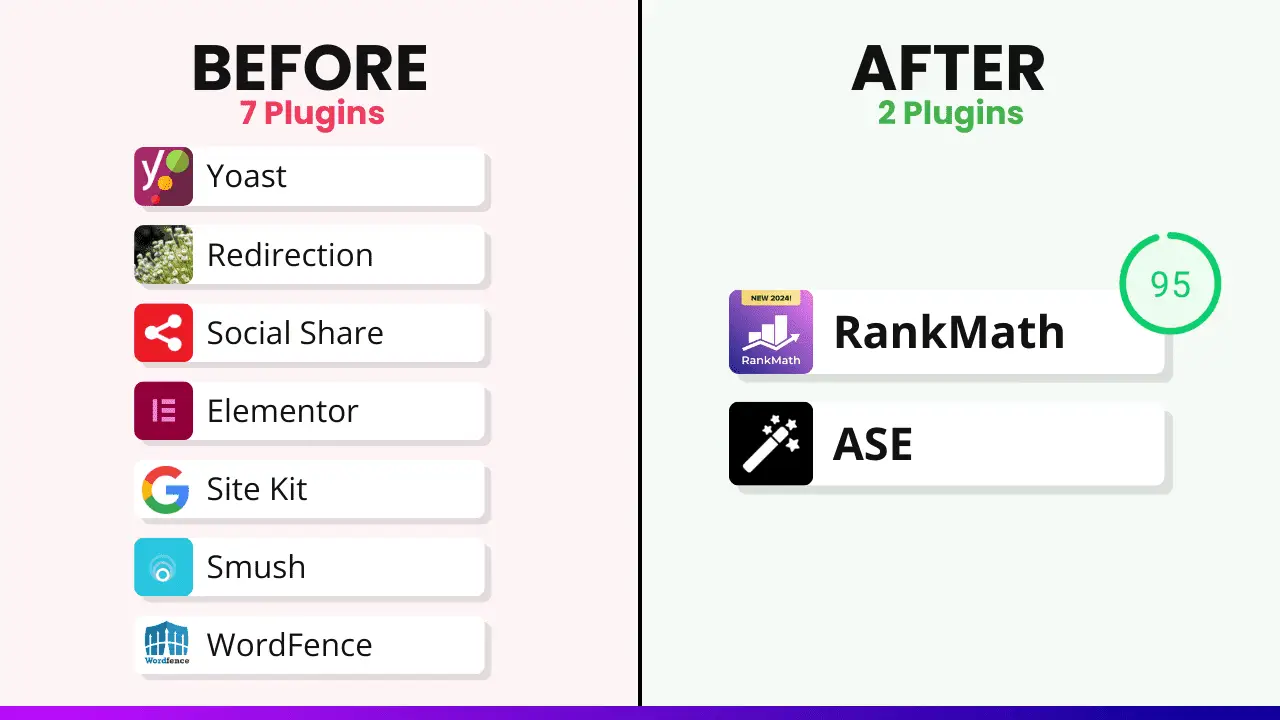WordPress plugins are essential for enhancing your website’s functionality. They can add features that aren’t included in the WordPress core. However, having too many plugins can significantly slow down your site. In this article, we’ll explore how you can improve your website’s performance by removing the right plugins without compromising on features and functionality.
The Impact of Plugins on Performance
One website managed to improve its performance by a whopping 61% simply by removing the right plugins. This dramatic improvement didn’t come at the cost of losing essential features. By applying the clever methods outlined below, you’ll learn which plugins to keep and which ones to remove.
Methods to Reduce Plugin Reliance
1. Use External Services Instead of Plugins
Offload some plugin functionalities to external services to reduce the load on your server. For example:
- Instead of using Site Kit, use Google Search Console or Google Analytics directly
- Replace firewall plugins with Cloudflare’s built-in firewall
- Eliminate image compression plugins by compressing images before uploading them to your website
2. Opt for Plugins with Multiple Functionalities
Many WordPress plugins perform only one function, but their features can often be replaced by larger, multi-purpose plugins. For instance:
- RankMath SEO plugin can replace 301 redirect and affiliate link plugins
- WP Optimize can handle caching, image compression, and database cleanup in one package
- Admin and Site Enhancement can replace dozens of smaller plugins
3. Use Plain HTML Instead of Plugins
Plain HTML is often more economical compared to a dedicated plugin. You can remove thousands of lines of code by adopting this simple technique. Examples include:
- Sharing buttons
- Contact forms
- Image galleries
- Countdown timers
- Ads
- Maps
If you’re not familiar with HTML, you can ask ChatGPT or Google to provide you with the necessary code.
4. Utilize Custom Snippets
Custom snippets allow you to implement more complex code almost anywhere on your website. The Code Snippets plugin is an excellent tool for this purpose. You can use it to:
- Insert Google AdSense code instead of using Ad Inserter
- Put your website in maintenance mode with a few lines of code
The plugin also provides a website where you can search for snippets you might want to use.
5. Embrace Basic WordPress Features
Many WordPress users are reluctant to use the basic features provided by WordPress core. However, WordPress is continually improving, and some plugins are becoming unnecessary. Consider using:
- WordPress’s built-in custom font upload feature
- Gutenberg instead of Elementor for page building
- Openverse for free stock photos
The Benefits of Reducing Plugin Reliance
By adopting these methods, you can:
- Spend less time managing plugins
- Reduce compatibility issues
- Improve overall website performance
Remember, while WordPress core may have some limitations, these constraints can foster creativity. Many developers have built and used WordPress with this mindset and found it to be not just adequate, but often better.
Conclusion
Reducing your reliance on plugins is a crucial step in boosting your WordPress site’s performance. By using external services, opting for multi-purpose plugins, utilizing plain HTML and custom snippets, and embracing WordPress’s basic features, you can significantly improve your site’s speed and efficiency.
Remember, the goal is not to eliminate all plugins, but to find the right balance between functionality and performance. With these strategies, you can create a faster, more efficient WordPress site without sacrificing essential features.






